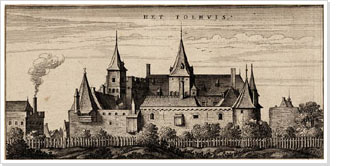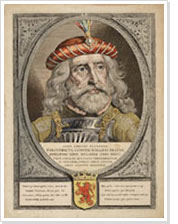The state treasury chest > Paying for land, water, air and roads the Frankish kings regalia (500-1300)

After the collapse of the Roman Empire around AD 500, the Franks took power. Trade caved in and there was little money in circulation. Serfs and free farmers lived in closed rural communities, under the protection of the king or the landowner.
The Frankish king had control of the regalia: he possessed all the land, water, air and road rights. Everyone paid him a ‘tax in natura’, be it for the land he cultivated, the right to hunt or the air that drove his windmill.
 Throughout the year, the Frankish king travelled all over his vast empire. During these travels, his subjects had to provide for all his needs and those of his large household, including dignitaries and assistants. As remuneration for their services, counts and bishops did not receive any money, but were granted fertile land in fief. They became the king’s vassals. In turn, they granted part of the land on loan to others.
Throughout the year, the Frankish king travelled all over his vast empire. During these travels, his subjects had to provide for all his needs and those of his large household, including dignitaries and assistants. As remuneration for their services, counts and bishops did not receive any money, but were granted fertile land in fief. They became the king’s vassals. In turn, they granted part of the land on loan to others.
In the 9th century, the mighty counts and bishops were given the right of immunity: the king abandoned almost all his rights to the lands he had given in fief and, in future, the count or bishop was entitled to administer justice and levy taxes himself.
